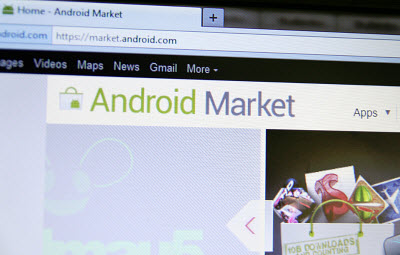The mobile operating system is continuing to hold strong to its grasp on the biggest share of the market.
Recent technology news has shown that Android is not only successfully keeping hold of its top share of the smartphone market, but it has also managed to widen the lead that it has over all of its competition.
The latest statistics from Strategy Analytics have shown that Android has now broken its own record.
The latest figures from the market research company, which were released in technology news, have shown that the gap that Android currently has in its lead over the rest in its share of the global smartphone market has now broken its previous records. During this year’s second quarter, the firm reported that there were a total of 295.2 million shipments of smartphones. In the last year, the global growth in smartphones has slashed itself nearly in half. A year ago, the growth rate had been 49 percent, with today’s rate being closer to 27 percent.
In the second quarter of 2014, Android managed to make massive technology news with 85 percent of the global market.
 The growth of the Android share in global smartphone shipments is a record breaking 85 percent and has caused the share of all of its competitors to shrink. Apple’s market share slipped slightly to reach 11.9 percent, after having shipped 35.2 million smartphones during the second quarter of the year. Samsung, alone has a 25 percent share of the smartphone market, which is a considerable drop from its previous share of 33 percent, after having shipped 74.5 million smartphones around the world.
The growth of the Android share in global smartphone shipments is a record breaking 85 percent and has caused the share of all of its competitors to shrink. Apple’s market share slipped slightly to reach 11.9 percent, after having shipped 35.2 million smartphones during the second quarter of the year. Samsung, alone has a 25 percent share of the smartphone market, which is a considerable drop from its previous share of 33 percent, after having shipped 74.5 million smartphones around the world.
According to the Strategy Analytics executive director, Neil Mawston, in a technology news statement, “Like the PC market, Android is on the verge of turning smartphone platforms into a one-horse race. Its low-cost services and user-friendly software remain wildly attractive to hardware makers, operators and consumers worldwide.” He also pointed out that competitors with other operating systems are going to need to do something enormous if they want to be able to cut into the tremendous lead that Android is maintaining in shipments of smartphones.
As though swipe cards and security cameras weren’t enough, some say that wearables will be the next step.
As wearable technology starts to flood the tech market in virtually every shape and form, from Google Glass to Samsung Gear and Pebble, there are now predictions being released to suggest that these devices will soon be used as the next level of employee tracking.
These wearable devices will give employers the chance to track workers in an effort to improve worker productivity.
At the same time, it is very likely that this will be quite a controversial use for wearable technology, as this will make some workers feel that this level of tracking will cut into their personal privacy. That said, it cannot be denied that it does present employers with an opportunity to gain a better understanding of how things are done and how they can be improved so that the job will be completed with greater efficiency.
Wearable technology could allow data to be collected in order to give employees the ability to work smarter.
 According to a workplace management company called Kronos, it is already creating products for retailers and manufacturers that have communication and tracking capabilities and that will be available for use before the close of 2014. When combined with this type of solution, wearables could come with the potential for considerable productivity and safety benefits, according to the Kronos vice president of global product management, Bill Bartow.
According to a workplace management company called Kronos, it is already creating products for retailers and manufacturers that have communication and tracking capabilities and that will be available for use before the close of 2014. When combined with this type of solution, wearables could come with the potential for considerable productivity and safety benefits, according to the Kronos vice president of global product management, Bill Bartow.
He provided the example that nurses could wear a sensor on their clothing that detects the individual’s heart rate. This would allow them to become more aware of their physical state so that long shifts would lead to a lower level of fatigue. Another example is in the case of manufacturing companies, which frequently ban the use of cell phones on the job. Instead, wristbands or smartwatches that include GPS or geolocation technology could be worn by the employees in order to remind them to return back to the job when they have over-extended their smoke breaks, said Bartow.
He went on to explain that with this type of wearable technology, “The manager could know their location and communicate with them through that device through an alert or a notification and say: ‘We need you immediately.’” In this, it seems that the tech will likely be far more popular among the employers than the employees.
 The growth of the Android share in global smartphone shipments is a record breaking 85 percent and has caused the share of all of its competitors to shrink. Apple’s market share slipped slightly to reach 11.9 percent, after having shipped 35.2 million smartphones during the second quarter of the year. Samsung, alone has a 25 percent share of the smartphone market, which is a considerable drop from its previous share of 33 percent, after having shipped 74.5 million smartphones around the world.
The growth of the Android share in global smartphone shipments is a record breaking 85 percent and has caused the share of all of its competitors to shrink. Apple’s market share slipped slightly to reach 11.9 percent, after having shipped 35.2 million smartphones during the second quarter of the year. Samsung, alone has a 25 percent share of the smartphone market, which is a considerable drop from its previous share of 33 percent, after having shipped 74.5 million smartphones around the world.
 According to a workplace management company called Kronos, it is already creating products for retailers and manufacturers that have communication and tracking capabilities and that will be available for use before the close of 2014. When combined with this type of solution, wearables could come with the potential for considerable productivity and safety benefits, according to the Kronos vice president of global product management, Bill Bartow.
According to a workplace management company called Kronos, it is already creating products for retailers and manufacturers that have communication and tracking capabilities and that will be available for use before the close of 2014. When combined with this type of solution, wearables could come with the potential for considerable productivity and safety benefits, according to the Kronos vice president of global product management, Bill Bartow.